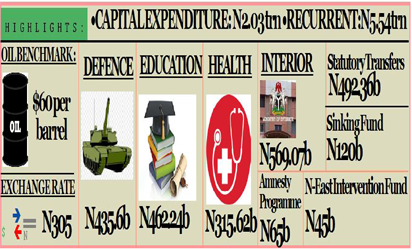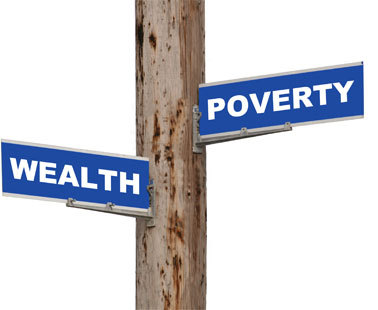By Emma Ujah, Abuja Bureau Chief & Sebastine Obasi
Amid revenue shortfall pressures, the Federal Government intends to introduce new taxes in the fiscal year 2019 as part of its efforts to boost revenue.
Briefing the media, yesterday, in Abuja on the 2019 budget, Minister of Finance, Mrs. Zainab Ahmed, said that the current focus of the ministry is on revenue because government has resolved to mobilize more domestic revenue so that it can better fund the budget.
She stated: “As you can see from the performance (of 2018 budget) that there is a gap between what is in the budget and what is actually generated. So we are doing what we can and very soon we will be generating new revenue initiatives which will include a new set of taxes and excise duties but also working with FIRS and Customs to enhance measures for enforcement and also for compliance.

“By doing what we are doing, we might be having to go to the National Assembly to amend some laws that we have identified which have some gaps, some loopholes. We are doing everything we can to make sure our budgets are better funded, going forward, and it will start from 2019.”
Oil price crashes further
Meanwhile, as government struggles with domestic non-oil revenue, more pressures seem to be on the oil revenue as the price of oil has shown a continuous decline throughout the week, despite production cuts adopted by the Organisation of Petroleum Exporting Countries, OPEC, to shore up prices.
Brent crude, the international benchmark, sold for $55.13 yesterday, while it sold for $60.28, $57.40 and $55.41, on Monday, Tuesday and Wednesday, respectively.
Heightened concerns of over-supply, reports of swelling inventories, forecasts of record United States and Russian output and intensifying concerns about a slowing global economy have all placed downward pressure on the value of a barrel of oil.
OPEC is reportedly planning to release a table detailing voluntary supply cut quotas among its members and allies, as the influential oil cartel steps up efforts to put a halt to one of the biggest oil price falls in years. OPEC Secretary-General, Mohammed Barkindo said to reach the proposed cut of 1.2 million barrels per day (bpd), the effective reduction for member countries would need to be 3.02 percent. That is higher than the initial 2.5 percent discussed earlier this month.
“In the interests of openness and transparency, and to support market sentiment and confidence, it is vital to make these production adjustments publicly available,” Barkindo reportedly told OPEC members in a letter.
Capital releases to hit N1.1trn
Against the backdrop of 2018 budget timelines, Ahmed also disclosed that capital releases for the implementation of the 2018 budget would hit the N1 trillion threshold at the end of this year.
She explained that the N820 billion reported capital releases captured only those of the Ministries, Departments and Agencies (MDAs) and that the figure would be higher if capital components of transfers to statutory organizations were captured.
Her words: “Let me say that the N820bn that has been released is just MDA capital because we have releases also that go to the statutory transfer agencies that is released to them in block and that amount includes both their personal recurrent as well as capital.
“There are also capital releases that are done as part of the capital supplementation; that is to say, it’s service-wide that is not in the N820bn. The N820bn is 43 per cent of MDA capital.
“We are working to push this to N1.1tn by the end of December, Insha Allah and that would be including the statutory transfers, the service wide (votes), as well as, the rest of the MDAs whose capital we are currently processing.”
Mrs. Ahmed also reacted to concerns about the depletion of the Excess Crude Account, saying that approval to draw down was given by the National Economic Council, a platform for consensus building between the federal and state governments on economic issues.
According to her: “The Excess Crude Account was refunded yesterday. We had sent another N50bn savings into the Excess Crude Account. If you recall, the NEC had authorized the use of $1bn from the Excess Crude Account for security, so the performance of that instruction is what has produced what we have in the Excess Crude Account.
“So it’s been largely depleted but we are still saving to it and this is the third month that we have been saving consistently into the Excess Crude Account.”
2018 budget’ll run till next June — Udoma
In his presentation, earlier, Minister of Budget & National Planning, Senator Udoma Udo Udoma, said that the 2018 budget would run until June next year.
He said that urgent steps are being taken to raise funds from Joint Venture Oil assets restructuring to finance the 2019 budget.
His words: “Mr. President has directed that immediate action be commenced to restructure the Joint Venture Oil Assets so as to reduce government shareholding to 40 percent and that this exercise must be completed within the 2019 fiscal year.”
He added that the Department of Petroleum Resources, DPR, has been mandated to complete the collection of past-due oil license and royalty charges, within three months.
Similarly, he said that the Ministry of Finance, working with all the relevant authorities, has been authorized to take action to liquidate all recovered, unencumbered assets within six months.
“Given the improved oil prices and production levels, Nigerian National Petroleum Corporation (NNPC) is to immediately commence the recovery of all outstanding obligations, including those due from Nigerian Petroleum Development Company.
“Finally, amongst other revenue generating initiatives, Mr. President has directed that work should be immediately concluded on the deployment of the National Trade Window and other technologies to enhance Customs collections efficiency from the current 64 per cent to up to 90 percent over the next few years,” he said.
Why oil benchmark was left at $60 pbl
On why the Federal Government left the oil price benchmark at $60 per barrel, Udoma said: “Notwithstanding the recent softening in international oil prices, the considered view of most reputable oil industry analysts is that the downward trend in recent months is not necessarily reflective of the outlook for 2019.
“However, we will closely monitor the situation and will respond to any changes in the international oil price outlook for 2019.”
Deficit
Overall budget deficit of N1.859 trillion contained in the 2019 budget represents 1.33% of GDP. Udoma said that the projected deficit was within threshold stipulated in the Fiscal Responsibility Act (FRA) 2007. The budget deficit is to be financed mainly by borrowing N1.649 trillion.
Recurrent
Recurrent (non-debt) spending is expected to rise by 34.17%, from N3.52 trillion in the 2018 budget to N4.72 trillion. The minister said that it was a reflection of increases in salaries & pensions, including provisions for implementation of a new minimum wage.
Debt service
At N2.14 trillion, debt service is 24.24% of planned spending, with provision to retire maturing bonds to local contractors decreased by 36.84% from N190 billion in FY2018 to N120 billion.
The Ministry of Power, Works and Housing was allocated the highest capital vote of N408. 03 billion, followed by Transport which got N194. 24 billion.
The third on the list was Defence with N158.12 billion; Agriculture and Rural Development, N80.29 billion; Water Resources, N73.58 billion; and Industry, Trade and Investment with N61.07 billion.
Works
About N280.44 billion for the construction and rehabilitation of roads in every geo-political zone of the country, such as: Counterpart Funding for the Dualization of Makurdi – Enugu Road; Counterpart Funding for the Dualization of Akwanga – Jos – Bauchi – Gombe Road; Reconstruction of the Outstanding Sections of Benin – Ofosu – Ore – Ajebandele – Shagamu Expressway; and Construction of Bodo – Bonny Road.
Other major works projection under this provision were: Pavement Strengthening and Asphalt Overlay of Ajebandele – Ijebu Ode – Shagamu Road; Construction of Oju/Loko – Oweto Bridge to link Loko and Oweto; Dualization of Ilorin – Jebba – Mokwa/Bokani Junction Road; Kano – Maiduguri Road (Various Sections) ; Abuja – Lokoja Road (Various Sections); Dualization of Obajana Junction to Benin (Various Sections); and Lagos – Shagamu – Ibadan Dual Carriageway.
Also captured were: Early Works for the Construction of 2nd Niger Bridge in Anambra/Delta States; Construction of Kaduna Eastern By-pass; Abuja – Kano Dual Carriageway; and Dualization of Odukpani – Itu – Ikot Ekpene Road
According to the budget breakdown, another N280.44 billion was provided for the construction and rehabilitation of several other roads including: Construction of Kano Western Bye Pass; Abuja – Abaji ; Suleja – Minna Road; Rehabilitation & Expansion of Lagos – Badagry Expressway; Rehabilitation of Vandeikya – Obudu – Obudu Cattle Ranch Road; Rehabilitation of Ilorin – Kabba – Obajana Road In Kwara/Kogi; Reconstruction of Nasarawa – Loko Road; Dualisation of Sapele – Ewu Road (various sections); Reconstruction of Bida – Lambata Road in Niger State; Rehabilitation of Ikorodu – Shagamu Road; Rehabilitation of 9th Mile – Orokam Road In Enugu State; Re-construction of Sokoto – Tambuwal – Jega – Kontagora – Makera ; Design and Construction of Bridge Across the Cross River at Uwana (Ebony State) to Nkomoro (Cross River State); and Construction of Road Falali, Birni, Bako to Furoja Town (Ningilga).
Power
Some of the major power projects’ provisions included: N1.02 billion for the Mambilla Hydro Power project; N400 million for construction of 215MW LPFO/ Gas Power station in Kaduna; N388.5 million for Kashimbilla transmission; and N398 million for Fast Power Programme Accelerated Gas and Solar Power Generation.
Housing
N30.04 billion was set aside for Federal Government National Housing Programme
Transport
N80.22 billion was provided as counterpart funding for Railway projects including: Lagos-Kano (on-going) ; Calabar-Lagos (on-going); Ajaokuta-Itakpe-Aladja (Warri -Ongoing) ; Port Harcourt- Maiduguri (new);Kano-Katsina-Jibiya-Maradi In Niger Republic (new); Abuja-Itakpe and Aladja (Warri)-Warri Port And Refinery Including Warri New Harbour (new); and Bonny Deep Sea Port & Port Harcourt and other Rail Projects
In addition, N13 billion was provided for construction of Second Runway at Nnamdi Azikiwe International Airport Abuja, as well as N1.008 billion for construction of Terminal Building at Enugu Airport.



![#SilencedVoices: ‘Magnetic Mom’ Brittany Galvin Gives Horrific Account of Her Paralyzing Journey Since Receiving Jabs [VIDEO]](https://newsrescue.one/wp-content/uploads/2021/08/brittany-218x150.png)
![Yoruba Man Burns Nigerian Passport, Dares SSS; Will Only Return To Odudua Republic [VIDEO]](https://newsrescue.one/wp-content/uploads/2019/10/burns-passport-218x150.jpg)





